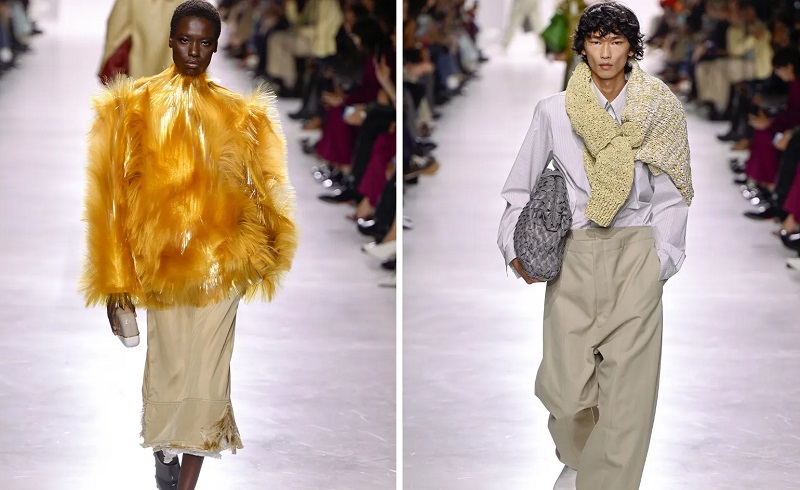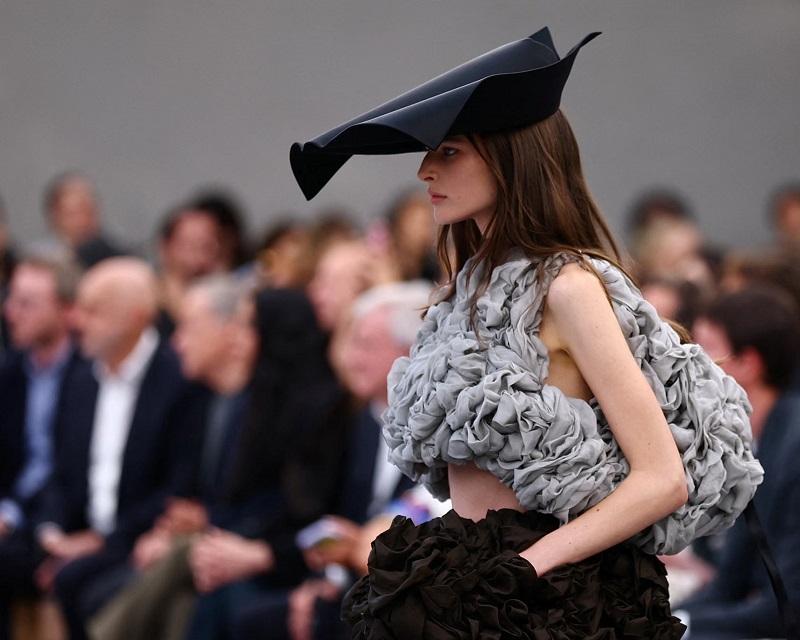FW
Levi Strauss & Co reported strong financial results for Q3, FY25, leading the company to raise its full-year outlook.
The company posted $1.5 billion in net revenues, marking a 7 per cent Y-o-Y increase on both a reported and organic basis. The DTC channel was a primary driver of growth, with net revenues increasing by 11 per cent. The e-commerce segment grew by 18 per cent while the DTC accounted for 46 per cent of total net revenues in the quarter, reflecting the success of the company's ‘DTC-first’ strategy.
Performance was strong across all regions, led by Asia where net revenues rose by 12 per cent while net revenues in Americas grew by 6 per cent and revenues in Europe increased by 5 per cent.
The company’s gross margin expanded by 110 basis points (bps) to 61.7 per cent, primarily due to a favorable channel mix and price increases.
Sri Lanka’s apparel sector is cementing its reputation as a global leader in sustainability, with top manufacturers like Brandix, Teejay Lanka, Hirdaramani, Hayleys Fabric, and MAS Holdings showcasing major strides in climate action, circularity, ethical practices, and community impact.
These manufacturers are at the forefront of the Net Zero movement. Brandix has cut emissions by 84 per cent and achieved Net Zero certification at five facilities, aiming for a Net Zero status across all its global locations by 2030. Hirdaramani is the country's first company to get SBTi approval for Net Zero targets.
The industry is also heavily invested in the circular economy. MAS diverted an impressive 99 per cent of its waste from landfills, and Brandix achieved a 90 per cent recycling and recovery rate. Teejay reused or recycled 3,900 tons of material and was appointed the patron company for the Sustainable Supply Chain Working Group by the UN Global Compact Sri Lanka. Hirdaramani is furthering its commitment with ‘Mihila Tex,’ a new sustainable textile mill.
Powering this push is a growing commitment to renewables. MAS Holdings reported that 397 per cent of its energy comes from renewable sources, contributing to a 24.04 per cent reduction in Scope 1 and 2 emissions from a 2019 baseline. Teejay Lanka has also expanded its renewable energy footprint to 14 per cent of its total consumption.
The social impact extends well beyond the factory. MAS created 2.1 million opportunities through community initiatives and increased women’s participation in management to 26 per cent. Brandix awarded over 1,000 scholarships and facilitated 47,000 pints of employee-donated blood. Hirdaramani’s decade-old ‘Wonders of Well-being (WOW)’ program has even gained global recognition, including case studies from Harvard University's T.H. Chan School of Public Health.
Sustainability is being driven by innovation, not just compliance. MAS saw a notable 40 per cent of its revenue generated from sustainable products, while Teejay approved 410 new, sustainable fabrics in the last fiscal year. Hirdaramani also won a Silver Award at the Global Chemical Leasing Award 2024 for its innovative natural detergent using soapberries.
Underpinning these efforts are strong governance and transparency practices. All four companies adhere to rigorous global standards, with Teejay aligning its reporting to GRI and IFRS S1 & S2, and Brandix reaffirming its zero-tolerance policy on wage violations and corruption.
Collectively, these milestones solidify Sri Lanka’s apparel sector as a responsible sourcing destination, illustrating how the industry is successfully shaping a future where fashion and responsibility go hand in hand.
Clothing Manufacturers Association of India (CMAI) successfully pre-launched its new Apparel Training Centre (ATC) at the Magus Fashion City, Bhiwandi, on October 7, 2025. Supported by Magus Fashion City, this strategic initiative signals a major commitment to enhancing skill development within India’s garment sector. The pre-launch event drew over 50 garment manufacturers and industry representatives.
The ATC is being spearheaded by Naveen Sainani, Hon General Secretary, CMAI and Anand Golecha Chairman-Sub Committee, ATC. The center aims to build an industry-ready workforce, boosting manufacturing productivity and empowering workers through targeted training designed to meet future industry requirements.
At the pre-launch, Sainani emphasized the center’s mission saying, CMAI Apparel Training Centre at Magus Fashion City, Bhiwandi will serve as a strategic hub for upskilling local garment workers, promoting productivity, and developing a skilled workforce prepared to meet global industry standards. CMAI plans to run the center with extensive industry collaboration to uplift the garment manufacturing community.
This latest launch builds on CMAI's impressive history in apparel training, which dates back to 2008. The association has previously trained over 1,600 women sewing operators in Baramati Hi-Tech Textile Park, successfully enabling employment opportunities.
Under the government's Integrated Skill Development Scheme (ISDS) (Component II of the Ministry of Textiles), CMAI was an appointed Implementing Agency. The organization surpassed its original mandate of training 35,000 trainees, ultimately training a total of 43,645 individuals and successfully placing 33,490 into relevant factory jobs by March 2018.
Established over sixty years ago, CMAI is the most representative association of the Indian apparel industry, boasting over 7,000 members and serving more than 50,000 retailers. Its membership spans manufacturers, exporters, brands, and ancillary industries.
Beyond skill development, CMAI plays a crucial role in advocating on industry policies, issuing Certificate of Origin (Non-Preferential) to exporters, and guiding members on ESG initiatives. In 2019, CMAI launched the SU.RE initiative to encourage the adoption of sustainable practices. CMAI is the only Indian association that represents the entire apparel sector and trade on prestigious international forums like the International Apparel Federation (IAF) in the Netherlands. The organization also led the creation of the Apparel Export Promotion Council (AEPC) back in 1978.
At its ITMA ASIA + CITME 2025 booth, Karl Mayer is featuring an original pleated skirt next to the new 2-bar tricot machine that produced its material. Noted for its unconventional concept and ‘unbeatable price-performance ratio,’ this machine will manufacture a fabric in gauge E 36 during the event.
Created from a super-stretch warp knit, the pleated skirt transforms the classic skirt into a comfortable, non-creasing, and non-restricting all-rounder with a sporty flair, giving the traditional pleated design a dynamic, fresh look.
The super-stretch warp knit transforms this classic wardrobe piece into a comfortable, non-creasing, and non-restricting all-rounder with a sporty edge, adding flair to the pleated design.
The rise of high-stretch fabrics from 2-bar tricot machines is revolutionizing the comfort and style of classic apparel.
These textiles boast premium performance features - they are super stretchy, breathable, and quick-drying - making them the go-to material for sportswear, athleisure, and swimwear. They offer a cool, silky feel against the skin, a super soft hand, and exceptional easy-care properties.
A standout benefit is their matchless sun protection. Densely knit fabrics, particularly those produced at the high gauge of E44, offer a UV protection factor that is more than double that of comparable circular knits, driving up demand, especially for outdoor clothing.
The comfort and functional excellence of these engineered smooth warp knits are now exciting the conventional apparel market. Consumers wearing items like suits, shirts, dresses, and skirts are demanding the same level of comfort, easy care, and modern style.

Yarn Expo Autumn 2025 concluded a highly successful run, firmly establishing its position as the premier international platform for the yarn and fiber industry. The event successfully united over 22,000 visitors from 111 countries and regions with nearly 580 exhibitors, creating an unparalleled sourcing hub in Shanghai.
Held concurrently with three other major textile fairs - Intertextile Shanghai Apparel Fabrics, CHIC, and PH Value - the exhibition offered a comprehensive, all-in-one marketplace. This synergy allowed international and domestic buyers to efficiently source a vast spectrum of products, from raw fibers and fabrics to finished garments, maximizing cross-sector collaboration.
The fair strongly emphasized the industry's crucial transition toward sustainability and innovation. Numerous exhibitors showcased groundbreaking eco-friendly materials, fulfilling a rising global demand for traceable and environmentally responsible products. This commitment was highlighted by Wilmet Shea, General Manager, Messe Frankfurt (HK), who noted, the event's vitality lies in how it ‘connects sustainability-driven solutions with worldwide demand,’ reinforcing the textile industry's progress with resilience and creativity.
Sourcing depth and global exchange
Yarn Expo Autumn provided impressive depth across its floor plan, featuring six specialized product zones and an International Yarn Zone. Suppliers presented a versatile mix that included:
• Natural fibers: With a heightened focus on quality and traceability.
• Innovative synthetics and specialty yarns: Catering to technical and functional fabric needs.
• Sustainable options: Addressing the growing shift toward a circular economy.
Notable exhibitors like Docotton Group AS (Turkiye), PT Dan Liris (Indonesia), and Rutex GmbH (Germany) attracted significant attention with their market-relevant innovations. Further enriching the fair's global profile were dedicated showcases, including the India Pavilion, Pakistan Zone, and Taiwan Zone, which offered concentrated access to each region's textile expertise and fostered new opportunities for cross-border trade.
The visitor profile was equally diverse, spanning spinners, knitters, fashion brands, and trade professionals from every part of the upstream and downstream value chain. This breadth ensures that the industry's latest trends and developments, from vortex-spun polyester to ultra-high-count compact-spun cotton, can be identified and sourced efficiently.
Exhibitor and visitor endorsements
The value of the platform was consistently echoed by the participants. Jimad Khan, International Sales & Marketing Manager, Perino by Woolyarns (New Zealand), said, the experience has been positive, with strong interest, enquiries, and sample requests. The fair is important for connecting with the entire supply chain.
Pradip Debnath, Business Head, Yajur Fibres (India), emphasized, by leveraging the platform helped the company connect with buyers and potential clients from over ten countries simultaneously
Ashwin Jaju, General Manager, Dricomfort (Optimer) in the US, noted, this year, the fair feels more crowded and has a more international presence. Overall, it offers great opportunities for networking and discovering new materials.
Huang Xianglun, Procurement Manager, Lite Trading Co (China), affirmed, as a VIP buyer, the company greatly benefitted from the clear guidance provided by the organizers, which significantly enhanced our procurement efficiency.
The combination of a world-class exhibitor lineup, a strong visitor base, and innovation-focused fringe events - such as the Textile Materials Innovation Forum- cemented Yarn Expo Autumn 2025's role as a vital platform that cultivates fresh ideas and drives the global textile industry forward. The next edition, Yarn Expo Spring, is scheduled for March 11–13, 2026.
The highly anticipated fashion week season, which came to a close recently in Paris, was not "business as usual". The numerous designer changes in Milan and Paris were met with high expectations, and according to Barbara Markert, co-Founder Weltreporter, founder LaSuite in a Linkedin post, they were largely fulfilled. This season marked a significant shift in the fashion industry, driven by a record number of debuts and a palpable sense of change and new ideas. The high concentration of new creative directors led to the season being called the "fashion week of the decade".

The traditional strategy of changing designers to revive a struggling luxury brand proved to be highly effective this season. This season saw a dozen fashion houses swap their creative directors for the upcoming Summer 2026 season alone, with two more houses celebrating their womenswear premiere after having already made the change for their menswear or haute couture shows.
Among the many new faces, several designers are credited with delivering strong collections:

● Matthieu Blazy at Chanel. Blazy stated that fashion needs to rethink its narrative, saying, "Luxury is no longer enough. It is expensive and rare, but is that enough? No, that is not enough".

● Pier Paolo Piccioli at Balenciaga.

● Louise Trotter at Bottega Veneta.

● J.W. Anderson at Dior. Anderson, who is new to Dior, explained that being "locked into history causes an implosion" and that "a change is inevitable".
One of the most notable debuts was Demna at Gucci, who did not waste time with grand speeches. Instead, he released his see-now-buy-now designs on Instagram and presented a film for a celebrity-filled audience in Milan, which was simultaneously made available to everyone online. His collection focused on modern reproductions of old Gucci bestsellers, a move that is already reportedly sending customers to stores and has caused Kering's stock price to rise sharply on the stock market.
Beyond the new designers, the season was also characterized by a democratization of fashion. This was seen in new formats and innovations, with designers and critics alike pushing back against the industry's elitist tendencies. For example, Glenn Martens, who is a designer for Diesel and Maison Margiela, distributed his Diesel collection throughout Milan, with models posing in plexiglass pods in public spaces like churches, bars, kiosks, and subway stations.
Another example of this shift was "La Watchparty," a public viewing of fashion shows created by social media fashion critic Elias Medini. This event brought back the collection discussions that had largely disappeared since the decline of bloggers around 2015. The audience at these events is different from those at the shows, consisting of young people more interested in the quality of the collection than in the looks of celebrities. This focus on the product and creative work, rather than on front-row attendees and "click-worthy" designs, gives cause for hope for the future of the industry.
The fashion industry has been grappling with a loss of glamour and sales, due in part to scandals involving poor quality, exploitative production, and questionable business dealings. There have also been accusations of "greedflation," where major brands have raised prices excessively without justification from innovative design or quality. This season's changes were seen as a necessary step to open a new chapter.
While many collections were successful, the debuts overshadowed other established brands' shows. It's difficult to recall the collections from Chloé, Dolce & Gabbana, Burberry, or Calvin Klein, as the sheer number of premieres commanded all the media attention. However, even the gossip surrounding this season—like Heidi Klum appearing as a bride at Vivienne Westwood's show or kitchen aprons becoming a trend at Miu Miu—indicates that something is changing in fashion.
This fashion week season saw a turning point in the industry, one that hopefully will continue to evolve in the coming years. The focus is returning to the product and collections, proving that fashion can once again captivate an audience. From this perspective, this season may indeed have been the "fashion week of the decade".
Max Easton has been named the new Chief Executive Officer of Smartex.
Easton's appointment follows two years during which he worked closely with fashion brands, demonstrating exceptional strength and leadership in executing the company's core strategic initiatives. He is now tasked with leading Smartex to its next stage of growth and strengthening the company's position as a key force shaping the future of the global textile and fashion industry.
A leader in applying AI to manufacturing, Smartex is expected to continue its aggressive expansion of technology adoption under Easton's direction. The company has been working in close coordination with its leadership team, board members, and investors to ensure a seamless transition. This focus remains firmly on executing its mission to transform the textile industry by implementing advanced technologies to bring transparency and efficiency to every step of textile manufacturing; pioneering solutions that dramatically reduce material waste in production and providing brands and consumers with verifiable data on their supply chains.
Easton is anticipated to leverage Smartex's patented real-time quality control and fabric defect detection systems to accelerate the push for a more sustainable and technologically advanced sector. His experience in operationalizing strategy with fashion brands is seen as critical to scaling the company's solutions globally.
British Wool’s recent sale saw the most intense level of competition in the last decade. All of British Wool’s main buyers were active, with UK, European and Chinese-focussed buyers competing to secure wool supplies. All core types traded significantly higher, with the main grades of carpet wool trading close to 20 per cent higher towards the end of the catalogue.
Prices in the sale on the 7thof October increased by 14.2 per cent over the mid-September sale. Over the month the prices achieved in the British Wescool auctions have increased by 22.5 per cent. The trend mirrors the price rises that have been seen in New Zealand with global demand for quality cross bred wools outstripping supplies.
The average sale price achieved on behalf of British Wool’s members was £1.18 per kg, a marked increase over the average sale price for the 2024 season. Sale prices last season averaged £1.00 per kg.
Andrew Hogley, CEO, British Wool, says, following some very positive conversations with the trade, the sales team is confident the strong demand will continue throughout the selling season.
Sales in New Zealand over the last few weeks have also been very competitive with global market demand for quality cross-bred wools outstripping supply, he adds.
This season’s wool is also generally of a higher quality than last season’s wool. The dry spring and summer resulted in whiter wool this season with more of the clip being classed as a No. 1 grade.
Test results for new season wool continue to be significantly better than last year for colour, and British Wool continues to produce a greater proportion of No.1 grades in the core types, notes Hogley.
British Wool has received a large quantity of wool from new and returning members this season, but the overall volume handled to date is running around 2 per cent to 3 per cent below last year.
Improved prices in the 2024 season encouraged many farmers who had been holding onto their wool, or using it on-farm, to present it for sale this year, adds Hogley.
As a co-operative British Wool seeks to maximise the returns for all sheep farmers. With prices having shown a further improvement over recent weeks, the organization encourages any members who still have wool on farm to send it in before the winter.
Based in Bradford, British Wool is owned by approximately 30,000 sheep farmers in the UK. It collects, grades, sells and promotes British Wool to the international wool textile industry for use in flooring, furnishings and apparel.
A new chapter for the global fashion and textile industry will be written, with the new India-UK Free Trade Agreement (FTA) serving as the pen. Industry leaders and government officials from India, meeting at a high-profile roundtable in London in September 2025, expressed overwhelming confidence that the deal will not only bolster bilateral trade but also position the two nations as a manufacturing powerhouse for the world.
The FTA, which was concluded in July and is expected to be operational by the end of India's current financial year, is a "gateway to all of this," according to Vikram Doraiswami, the High Commissioner of India to the UK. He highlighted India's unique position as one of the only countries in the world with a complete, end-to-end textile value chain, from "the growth of cotton right up to the finished product."
This comprehensive capability, combined with a youthful and vast workforce, makes India an unmissable partner for the UK and the global market. "I would say there is no choice. It's just that you are delaying this decision," opies Shubhra Agarwal, a trade advisor from Ministry of Textiles.
A partnership for global ambition
The ambition of the new agreement extends far beyond simple bilateral trade. Doraiswami emphasized the potential for the two nations to become "partners for the global market" and even for the "totality of the opportunity in the European continent." He sees a clear synergy, with the UK's innovation and design prowess a "place in which a lot of this innovation takes place," complementing India's manufacturing strength. This partnership could see new collaborations in high-end fashion, sustainable materials, and the rapidly growing sportswear and athleisure sectors.
Sudhir Sekhri, Chairman, Apparel Export Promotion Council (AEPC), is bullish on the immediate impact. He predicts that India’s textile and apparel exports to the UK will grow at least two and a half times within the next three years, making India the UK’s second-largest supplier. Sekhri also notes that the swift implementation of the agreement is now in the hands of UK buyers, who must pressure their government for timely approval.
Focus on sustainability, technology, and traceability
The roundtable also underscored India's commitment to modern, sustainable, and transparent manufacturing practices, which align with the demands of major UK retailers like Primark, ASOS, and Boohoo. The Indian government has launched several initiatives to support this transformation.
For example the Production Linked Incentives (PLI) scheme, program is designed to attract investments in high-value man-made fibers (MMF), apparel, and technical textiles, ensuring the industry evolves with global demands. The PM-MITRA scheme an initiative to create seven mega textile parks across India, providing world-class infrastructure to streamline production and foster innovation.
Then there is the traceability blockchain system by the Cotton Textiles Export Promotion Council (TEXPROCIL). It is a groundbreaking blockchain system that allows end-to-end traceability of cotton, from the farm to the final product. Siddhartha Rajagopal, TEXPROCIL's Executive Director, claims this indigenously developed platform is a world-first, providing real-time data and rigorous testing to ensure authenticity. Vijay Kumar Agarwal, Chairman of TEXPROCIL, highlighted the system, noting it "can trace which farm the cotton has come from, right up to which factory has produced the final product."
Domestic and global growth
Beyond exports, panelists also pointed to the immense potential of India’s domestic fashion market. India’s high commissioner Doraiswami noted that the market, projected to be worth $250 billion by 2030, presents a "considerable" opportunity for UK manufacturers to partner with Indian businesses. The rapid growth of both high-end and fast fashion segments in India, along with the exponential rise of e-commerce, is transforming the retail landscape across the country. Neelam Shami Rao, Secretary, Ministry of Textiles, emphasized the critical role of technology in achieving India's ambitious target of $100 billion in textile exports by 2030. She cited tools like VisioNxt, a smart forecasting tool developed by the National Institute of Fashion Technology (NIFT) that uses intelligent modeling to predict future trends, colors, and designs.
The consensus from the London roundtable was clear: the India-UK FTA is more than a trade deal. It is a strategic partnership designed to leverage the unique strengths of both nations, driving growth, innovation, and sustainability in the global fashion sector for years to come.
The Dhaka International Textile and Apparel Expo-2025 (DTA Expo 2025) commenced at the Bangladesh-China Friendship Conference Center (BCFCC), marking a key event to accelerate growth and showcase global innovation in the ready-made garment (RMG) sector.
Organized by Eco Expo, the three-day exhibition was inaugurated by Mohammad Hatem, President, BKMEA. A number of industry leaders attended as special guests, including Nipa Jannat, Director, BGBA and EBFCI and Masoodar Rahman, President, BGMEA.
This year's DTA Expo is one of the largest international textile and apparel platforms in Bangladesh, featuring over 750 exhibitors from more than 15 countries across 60 stalls. Leading manufacturers from China, India, and Pakistan are showcasing cutting-edge machinery, sustainable fabrics, smart apparel technologies, and innovative solutions.
The expo premises were bustling from day one, with visitors generating new business connections and partnerships among local and international entrepreneurs.
Industry representatives highlighted the expo's potential for greater collaboration. A representative from Pakistan’s Unicorn International noted, the shipping cost from Pakistan to Bangladesh is relatively high. If a direct trade route can be opened, investment and business opportunities will expand significantly.
Chinese company, Li Ha affirmed, the expo will ‘further strengthen’ China's already substantial investment relationship with the Bangladeshi market.
Visitors were impressed by the level of technology on display. Habibur Islam avered, the fair gives a clear picture of where Bangladesh stands in the global market Another visitor, Chaiti Ghosh, added, the fair is beautifully organized. and will open a new horizon for Bangladesh apparel industry.
The RMG sector remains a cornerstone of Bangladesh’s economy, with export earnings having reached $50 billion by the end of 2024.
Rezwanur Rahman, CEO, Eco Expo, stated, the fair helps Bangladesh connect with global standards and open new pathways for sustainable growth. The DTA Expo 2025 runs daily through October 11, 2025.












